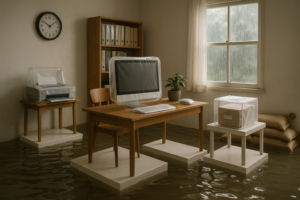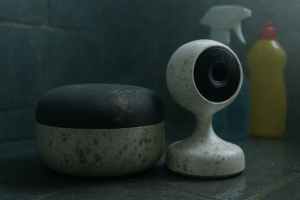Why is Pipe Freezing a Problem?
Being in the water damage restoration industry allows us to see homes damaged by many forms of water intrusion. When winter hits its hardest, and the temperature falls below freezing, the most common water losses we see are caused by pipes freezing and busting.
When water freezes, it expands and puts pressure on the pipes in your home, causing them to break and dump thousands of gallons of water in and around your home. These breaks can be the most destructive to your home and disruptive to your everyday life.
The good thing is that there are things you can do to prevent this from happening to your home and family.
Which Pipes are Most Likely to Freeze and Bust?
- Water supply lines and manifolds are located in the exterior walls of your home that are poorly insulated or have no insulation at all.
- Water supply lines outside your home, above ground, or buried close to the surface, like water sprinkler systems, swimming pool supply systems, and outdoor hose bibs or faucets.
- Water supply lines in unheated areas inside your home. These areas will most likely be attics, garages, utility closets, under kitchen and bathroom cabinets, crawl spaces, and basements.
- Leaving your heat off and leaving town can cause all the plumbing in your home to freeze if temperatures fall below freezing.
How to Protect Your Above Ground Pipes from Freezing:
The best way to protect a pipe from busting in your home and causing severe damage is to be proactive. Pay attention to your local weather and follow these recommendations before the onset of freezing temperatures.
- Protect your swimming pools by draining the pool and the water supply lines. Be sure to follow the directions provided by the manufacturer. Unless directed, putting antifreeze in your pool or the plumbing lines is not recommended. It can harm humans, pets, wildlife, and landscaping.
- Protect your sprinkler system by turning it off and draining the lines. It is essential to check your sprinkler supply lines to make sure they are buried deep enough and adequately insulated. It is common to find improperly installed irrigation systems.
- Protect your outside hose bibs by removing, draining, and storing your water hoses. Some homes have water shut-offs to the outside house bibs located inside the home. If this is the case for you, turn off the water supply to your exterior hose bibs and open them up completely from the outside.
- Protect the water supply lines in your crawl space, attic, and basement by adding insulation on and around the pipes. Insulation will help these areas maintain a higher temperature during freezing weather.
- Protect water supply lines in unheated areas of your home, like your garage and under bathroom and kitchen cabinets, using products to insulate pipes. Many products, such as pipe sleeves, are made specifically for these situations.
- Check with your plumber if these recommendations are beyond your skill level. Your plumber may have even more cost-effective tips and insight to help you protect the pipes in your home from freezing and busting.
How to Prevent Your Pipes from Freezing:
Just as important as protection is prevention. Here are some preventative steps you can take that can save you from pipes busting.
- Busted pipes in garages caused by freezing are remarkably ordinary. Prevent this from happening to you by simply keeping your garage door closed during freezing weather. You can also use foam insulation to seal the open spaces around your garage door.
- Bathrooms and kitchens are some of the most time-consuming areas of the home to restore. Leave the cabinet doors open to allow warm air from your home to circulate in these areas.
- The most common frozen pipe prevention tip is letting cold water drip from the faucet during freezing weather. This tip is very effective, even if it is a slow drip.
- It’s great if your home has central air and heat. Be sure to keep the temperature on your thermostat similar day and night. We’ve seen the water supply systems in whole houses freeze and bust because people turned off their central heat and left town for a couple of days.
Best Ways to Thaw Frozen Pipes:
Frozen pipes in your home can be a nightmare and, if not thawed correctly, can leave you in a world of pain. If you’ve discovered that your pipes have frozen, here are some things you can do to save time and money.
- The first step is turning off the water to your home at the main. There is usually a homeowner shut-off valve, but you may need a water shut-off tool. Doing this will prevent large amounts of water from entering your home once the pipes have thawed if you have a break somewhere. The most likely place you may have a frozen pipe is against an exterior wall or where your main water supply line enters your home through the slab.
- Turn on the heat in your home and open up all the faucets. As the pipes begin to melt, you will want the water to flow through the pipes and into your sink. Running water will also speed up the thawing process. Watch for water on the floor and water spots on any drywall. This could be a sign of a break.
- If you can locate the frozen pipe and it’s accessible, you will want to thaw it using mild heat. Do not use any open flame technique, which can cause the water to evaporate and build up pressure. An excellent tool to use would be a hair dryer or space heater.
- Pipes in your home will generally thaw out as the heat rises. Once all the pipes have been thawed, you can turn on the water from the main. This is when you will generally find out if you have a significant break. Be sure to only turn the water on for about three seconds, then turn it back off. Go inside and inspect for water damage. Repeat this step until you are sure there are no breaks. If you did experience a break, then call out a licensed plumber and a reputable water damage restoration company.
- You will know that all the pipes in your home are safe when you regain normal pressure and temperature.
If you follow these prevention and protection tips, you should be able to avoid any problems with frozen pipes. If you find yourself in need of a frozen pipe cleanup All Nation Restoration of Austin is here to help. For more questions, please call us at (512) 934-8180. Also, help your friends and family avoid frozen pipes by sharing this post using the social media icons below.







